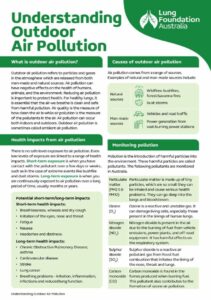This factsheet from Lung Foundation Australia provides information on outdoor air pollution and the impact on lung health.
This factsheet explains what outdoor air pollution is, what causes air pollution, how it is monitored, and the potential health impacts from air pollution. Outdoor air pollution, also known as ambient air pollution, is a growing environmental and public health concern. Lung Foundation Australia’s “Understanding Outdoor Air Pollution” factsheet outlines the causes, health impacts, and practical steps individuals can take to reduce exposure and contribute to cleaner air.
Air pollution is caused by both natural sources—such as bushfires and dust storms—and man-made sources like vehicle emissions, coal-burning power stations, and industrial activities. Key pollutants include particulate matter (PM2.5 and PM10), ozone (O₃), nitrogen dioxide (NO₂), sulphur dioxide (SO₂), and carbon monoxide (CO). These pollutants can penetrate deep into the lungs and bloodstream, leading to serious health issues.
Short-term exposure to air pollution can cause symptoms such as breathlessness, coughing, fatigue, and eye irritation. Long-term exposure is linked to chronic respiratory diseases like asthma and COPD, as well as cardiovascular disease, stroke, and lung cancer. Vulnerable groups include children, the elderly, pregnant women, and individuals with pre-existing lung conditions.
The factsheet offers actionable tips to protect yourself and your family, including checking local air quality reports, staying indoors during high pollution events, using air conditioning in recirculation mode, and wearing N95 masks during bushfires or dust storms. It also encourages lifestyle changes such as quitting smoking, staying physically active, and maintaining good lung health through vaccinations.
To reduce your environmental impact, the guide recommends using public transport, maintaining vehicles, avoiding wood-burning stoves, and choosing energy-efficient appliances. Planting low-allergen trees and using renewable energy sources like solar power are also encouraged.
For more information and resources about protecting your lung health, visit Lung Foundation Australia’s website at lungfoundation.com.au.
Was this page helpful?
Good job! Please give your positive feedback
How could we improve this post? Please Help us.
